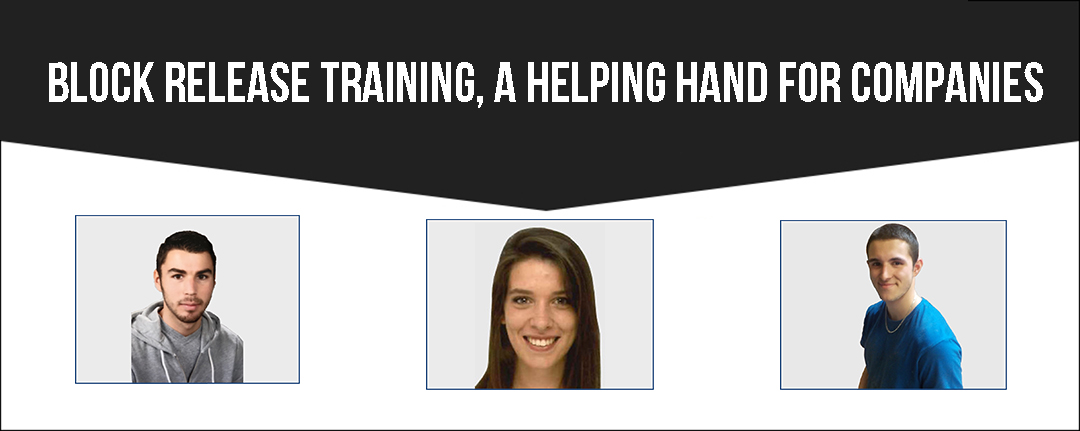Pompes grosclaude is investing in our young people. As a very small company, it is up to us to tread carefully in the market and anticipate its developments. To help us, we are investing in three young block release trainees and giving ourselves a new lease of life. This translates into three new ways of looking at our activities, our processes etc. Block release training, for us, is a chance to exchange views in a way that is beneficial to both sides.
What is alternation?
Block release training is a system of education which enables students to make their first steps in the professional world while continuing their education. They alternate periods of work at their job in a company with periods of study in their place of education.
Block release training can last for between one and three years depending on the trainee’s job and the diploma he/she is studying for. The rhythm of block release training also varies: (non-exhaustive list)
Weekly :
• 3 days studying/2 days working
Monthly :
• 1 week studying /3 weeks working
• 2 weeks studying /2 weeks working
There are two types of block release training contracts in France, an apprenticeship contract and a professional training contract.
THE APPRENTICESHIP CONTRACT : « Any young person aged between 16 and 25 can enter into an apprenticeship. Wages, calculated as a percentage of the minimum wage (between 25% and 78%), vary depending on the age of the apprentice and his/her position in the training cycle.
Any private sector employer can take on an apprentice provided they can show that they have taken the necessary organisational measures for an apprenticeship, notably, monitoring by an apprenticeship supervisor. » source: INSEE
THE PROFESSIONAL TRAINING CONTRACT : « suitable for any young person aged between 16 and 25 and any job-seekers aged 26 or above. It is a block release training contract of fixed or open length that includes professional experience. […] in theory, its length is comprised between 6 and 12 months, but it can be extended to 24 months by industry-wide collective agreement. The training part must be equal to at least 15% of the length of the professional experience. Those aged between 16 and 25 are paid as a percentage of the minimum wage (between 55% and 80%) according to their age and their level of education; other employees’ wages must not be less than the minimum wage, nor less than 85% of the company’s minimum wage. » source : INSEE
Advantages of taking on and train a block release trainee
“Taking on a block release trainee is not just a chance to hire low-cost workers. It implies in-company training. That is why, taking on a block release trainee is really about anticipating and planning his or her employment at the end of the training period.
It is an opportunity for the company to train a young person at very little cost who, when he/she has finished school, will be fully capable of fulfilling the demands of the job.
This anticipation also benefits the management of jobs and skills forward planning. By «forming» the block release trainee in its in-house practices, the company also has time to prepare its resources for future hiring.
With one foot still in school, the trainee is also an asset for the company. Quite often people in the world of work are not aware of certain theories or methods that could help them. Block release trainees have at their disposal, thanks to their teachers, tools that are designed to help companies develop. In addition, the aim of block release traineeships is not just to fulfil a mission. Depending on the trainees’ level of education and the aim of their diploma, they often have to work on finding new directions, even new means for improving their companies’ performances.
This element brings a new source of dynamism to the companies’ workforces. Their new way of looking at things and their recently acquired knowledge are often rich mines of added value for the companies.”
Tax and financial benefits
The tax and financial rewards of block release traineeships can be found in the financial aids and tax exemptions which are given. In theory, these advantages make hiring trainees accessible to very small businesses, in particular:
Aid & Exemptions (depending on the size of the company and the collective agreement attached to the trainee’s job)
Professional training contracts :
• Reduced employer contributions
• Recruitment subsidies
• Cost of the training covered by the company’s OPCA (Approved vocational training fund)
Professional training contracts :
• Exemption from employer contributions
• Apprentice recruitment aid
• Apprenticeship subsidies
• Apprenticeship tax credit
Source : CCI Paris
Pompes Grosclaude made this choice !
Technical sales representative trainee – 2 years/BTS NRC – IFA Chauvin Osny (95)
Export chargé d’affaires trainee – 1 year/Licence Professionnelle AVI – IUT Lyon 1 (69)
Installation technician trainee – 2 years/Bac Professionnel Industrial equipment maintenance – AFPM Lyon (69)
Management assistant trainee – Hired/BTS Management assistance – Lyon (69)


